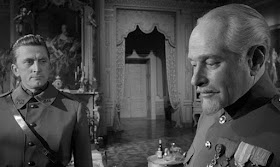 |
| Kirk Douglas and George Macready |
PATHS OF GLORY (1957). Director: Stanley Kubrick.
"
There is no such thing as shell shock." -- General Mireau
French WW 1 General Paul Mireau (George Macready) initially makes it clear to General Brouard (Adolphe Menjou) that there is no way his battalion can possibly take a strategic position known as the "anthill." But Mireau changes his tune when Brousard talks about a promotion, even though they expect at least 60% casualties among their men.
 |
| Wayne Morris and Ralph Meeker |
Now Mireau's second-in-command Colonel Dax (Kirk Douglas) is told in no uncertain terms that the men -- already exhausted and demoralized -- must take the hill the next day or else. Although the soldiers try their damnedest, it is an impossible and indeed suicidal task, and Mireau accuses them of cowardice. (Mireau even wants to fire on his own men because they aren't moving fast enough!) Mireau is talked out of shooting a hundred soldiers, but three are to be court-marshaled as an example. These three men are Private Arnaud (Joe Turkel of
The Glass Wall); Private Ferol (Timothy Carey of
The World's Greatest Sinner and Kubrick's
The Killing); and Corporal Paris (Ralph Meeker), who is picked because he knows that his superior officer, Lt. Roget (Wayne Morris), essentially murdered one of his soldiers. Dax represents the men in what is basically a kangaroo court with an outcome that is clearly pre-ordained.
 |
| Old pros: Macready and Menjou |
Paths of Glory is a powerful and maddening film, examining the outrageous miscarriages of justice and heartlessness that can take place during war time even among men fighting on the same side. The performances are excellent: a borderline slimy Menjou; an upright and morally-repulsed Douglas; Meeker, whose trademark cockiness eventually vanishes when he faces his own mortality; and Wayne Morris giving an unexpectedly strong performance as the morally-bankrupt Roget. Turkel and Carey are also notable -- as is Richard Anderson as the prosecutor -- but the one actor who positively walks away with the film is George Macready, who gives an absolutely ferocious and mesmerizing portrayal of the utterly loathsome and infuriating Mireau -- forget
Gilda (in which I didn't think Macready was even all that great),
this is the performance he should be remembered for.
Kubrick beautifully -- or rather horrifically -- recreates the WW 1 battlefield, and scenes of the men in the trenches as bombs explode unnervingly all around them are compelling, The film almost goes a bit off-course in the second half when it has aspects that remind one of the later
Dr. Strangelove, but for the most part this is one of Kubrick's most successful and effective movies. Several years later the film
King and Country had a similar theme but was not as good.
Verdict: George Macready's finest hour and a half and a highly memorable if imperfect picture for Kubrick. ***1/2.



This one has been on my list for quite a while; it is the only Kubrick I have not yet seen. I guess I need to be in the mood for a heavy duty war movie. (I do like Full Metal Jacket, though.)
ReplyDelete- Chris
Yes, you do need to be in a certain mood for this because movies like this can be quite depressing. That is probably why I resisted seeing it until I decided to finally watch it for my Ralph Meeker retrospective. Glad I did however because it's quite a movie!
ReplyDeleteI haven't seen it in years but do recall McCready and Douglas as powerful and brilliant in their roles. Carey was an odd choice but it seemed as though Kubrick was one of the few directors to keep him reined in. Kubrick was really on a roll and along with Spartacus (where he pinch hit and replaced Anthony Mann), Lolita and then dr. Strangelove, was in his prime. Thanks for the great writeup on an excellent film!
ReplyDeleteAnd thank you for the kind words and for your comments! Yes, this picture is definitely on the short list of Kubrick's best films. Kubrick also worked with Carey in "The Killing," another one of Kubrick's finest movies.
ReplyDelete